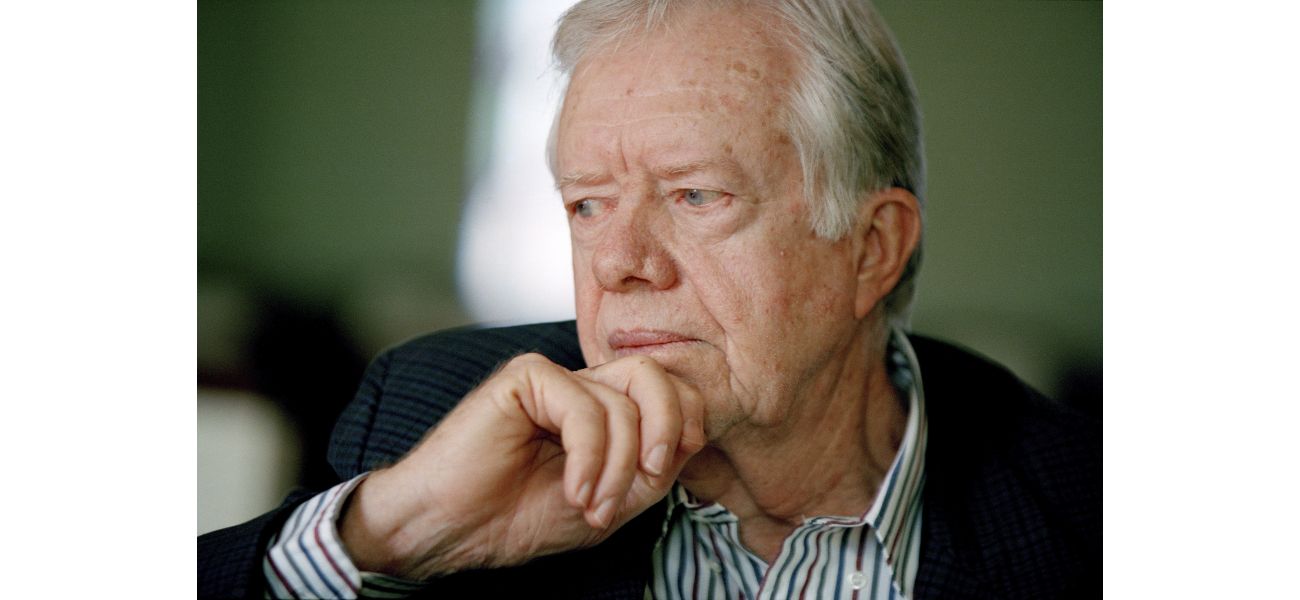Former US President Jimmy Carter passed away at the age of 100.
Former US President Jimmy Carter, who rose to power during a tumultuous time and later focused on humanitarian work, has passed away.
December 29th 2024.

Sad news has struck the nation as former U.S. President Jimmy Carter has passed away at the age of 100. A true American icon, Carter rose to prominence as a peanut farmer who went on to become the leader of the free world in the aftermath of the Watergate scandal and the Vietnam War. Despite facing defeat after serving just one term in office, Carter's impact on the world did not end there. He went on to redefine what it means to be an ex-president, dedicating his life to humanitarian efforts on a global scale.
Carter's passing was announced by The Carter Center, the organization he founded with his late wife, Rosalynn. They had both spent most of their lives in the small town of Plains, Georgia, where the former president called home. He had been under hospice care for over a year before he passed away peacefully at his residence. The center released a simple statement on social media, sharing the sad news with the world.
The legacy of Jimmy Carter is one that will continue to challenge our political assumptions and stand out among the 45 men who have held the highest office in the nation. He was a man of many talents, from being a successful businessman and Navy officer, to an evangelist, politician, negotiator, author, and woodworker. But above all, he was a citizen of the world, using his ambition, intellect, and strong work ethic to make a difference wherever he could. As he once said, his faith demanded that he do so.
Carter's journey to the presidency began as a little-known governor from Georgia, with a smile as broad as his Baptist morals and a technocratic approach to politics. His humble campaign, which relied on public financing and a promise to never deceive the American people, resonated with the public after the scandal and turmoil of the previous administration. He narrowly defeated Republican incumbent Gerald Ford, who had lost favor for his controversial pardon of Richard Nixon.
As president, Carter faced numerous challenges, from the Cold War and volatile oil markets to issues of racism, women's rights, and America's role in the world. But his most notable achievement was brokering a peace deal in the Middle East between Egypt and Israel, which he accomplished after 13 days of intense negotiations at Camp David. This experience would inspire the post-presidential center that would become a central part of his legacy.
However, not all of Carter's time in office was marked by success. His presidency was plagued by double-digit inflation, long lines at gas stations, and the 444-day hostage crisis in Iran. And despite his best efforts, he faced a devastating defeat in the 1980 election to Republican Ronald Reagan. Looking back, Carter acknowledged that he may have been too controlling and struggled to work with Congress and the federal bureaucracy. He also underestimated the influence of the media and lobbyists on his political fortunes.
But as they say, when one door closes, another one opens. And for Carter, this defeat allowed for a new chapter in his life. Along with his wife, he founded The Carter Center, using it as a platform to promote democracy, public health, and human rights around the world. He was not interested in simply building a museum or storing his White House records and memorabilia. Instead, he wanted a place where he could continue to make a difference.
And make a difference he did. From easing nuclear tensions between North and South Korea to negotiating cease-fires in Bosnia and Sudan, Carter's diplomatic efforts earned him a Nobel Peace Prize in 2002. He also worked tirelessly to eradicate the guinea worm parasite and famously built homes with Habitat for Humanity. His determination and self-assuredness often led him to go against the norm, sometimes even frustrating his successors. But he remained true to his beliefs and principles, unafraid to speak out against injustice and advocating for the inclusion of North Korea in international affairs.
Carter's work took him to remote villages where he was greeted by young children named after him, a testament to the impact he had on people's lives. But despite his global travels, he remained rooted in his small hometown of Plains. He and Rosalynn continued to live in the same house they had before he became governor, which had now been expanded and guarded by Secret Service agents. Carter even taught Sunday School lessons at his local church until health issues and the COVID-19 pandemic prevented him from doing so.
While many have said that Jimmy Carter was a better ex-president than president, he never agreed with this sentiment. His prolific post-presidency may have given him a brand above politics, but he was always striving to make a difference in the world. And as time has passed, historians and biographers have come to reassess his time in office, recognizing the achievements he made during his presidency. From deregulation and reducing U.S. dependence on foreign oil to focusing on human rights in foreign policy and normalizing relations with China, Carter's legacy is a significant one.
As former Secretary of State Madeleine Albright once said, our country was lucky to have Jimmy Carter as our leader. He may have been underestimated and misunderstood, but his impact on the world will not be forgotten. His life was truly an epic one, spanning from a humble beginning in a home without electricity or indoor plumbing to becoming a key figure on the world stage for decades to come. He will be greatly missed, but his legacy will continue to inspire generations to come.
The world was saddened by the news of former U.S. President Jimmy Carter's passing. He was 100 years old and had lived a remarkable life. From being a peanut farmer to winning the presidency during a time of great turmoil, his journey was nothing short of extraordinary.
Carter, along with his wife Rosalynn, lived most of their lives in the small town of Plains, Georgia. It was where they both passed away, with Rosalynn preceding him in November 2023. Their home was also the location of The Carter Center, an organization they founded in 1982 to promote humanitarian efforts globally.
With a diverse resume that included being a businessman, Navy officer, evangelist, and politician, Carter was a man of many talents. He was also a skilled negotiator, author, and woodworker. His path to the presidency was unconventional, but he proved to be a formidable leader who challenged traditional political assumptions.
Carter's faith played a significant role in his life, and he firmly believed in making a positive impact wherever he could. He once said, "My faith demands that I do whatever I can, wherever I am, for as long as I can, with whatever I have, to try and make a difference."
As a moderate Democrat, Carter's campaign for the presidency in 1976 was modest, relying on public financing and a promise not to deceive the American people. His victory over the incumbent Republican Gerald Ford was narrow, but it was a significant win after the aftermath of the Watergate scandal and the Vietnam War.
Carter's presidency was marked by global tensions, economic challenges, and social upheaval. However, his most significant achievement was brokering a peace deal between Egypt and Israel in 1978 at the Camp David negotiations. It was a defining moment for his administration and inspired the establishment of The Carter Center after his term ended.
However, his political coalition began to unravel due to inflation, fuel shortages, and the Iran hostage crisis. The failed rescue mission in 1980, which resulted in the deaths of eight Americans, was a significant blow to his presidency. He lost the 1980 election to Republican Ronald Reagan by a significant margin.
Carter's approach to governing was often met with criticism, and he acknowledged that he could be "micromanaging" and "excessively autocratic." His reluctance to engage with the media and lobbyists also proved to be a hindrance in his political career.
Despite his defeat, Carter's post-presidential years allowed for renewal and a focus on global humanitarian efforts. Along with his wife, he founded The Carter Center, which became a base for their work in promoting democracy, public health, and human rights.
Carter's globetrotting took him to remote villages where he was affectionately called "Jimmy Carter" by the locals. But he spent most of his days in the same house in Plains, Georgia, where he lived before becoming governor. He was also a regular Sunday School teacher at Maranatha Baptist Church, drawing visitors from around the world.
Carter's legacy as an ex-president was often seen as more successful than his presidency, a notion that he and his allies rejected. In his post-presidential years, he achieved significant accomplishments, including easing tensions in North and South Korea, negotiating cease-fires in Bosnia and Sudan, and monitoring elections globally.
His stubbornness and self-assuredness often proved to be effective, but it also caused friction with his successors. He was unafraid to speak out against government actions that he believed were wrong, such as the invasion of Iraq in 2003.
Carter's contributions were recognized globally, and he was awarded the Nobel Peace Prize in 2002 for his efforts in finding peaceful solutions to international conflicts and promoting human rights and development.
His passing is a loss for the world, and his legacy will continue to inspire future generations. As Carter himself said, "The world is
Carter's passing was announced by The Carter Center, the organization he founded with his late wife, Rosalynn. They had both spent most of their lives in the small town of Plains, Georgia, where the former president called home. He had been under hospice care for over a year before he passed away peacefully at his residence. The center released a simple statement on social media, sharing the sad news with the world.
The legacy of Jimmy Carter is one that will continue to challenge our political assumptions and stand out among the 45 men who have held the highest office in the nation. He was a man of many talents, from being a successful businessman and Navy officer, to an evangelist, politician, negotiator, author, and woodworker. But above all, he was a citizen of the world, using his ambition, intellect, and strong work ethic to make a difference wherever he could. As he once said, his faith demanded that he do so.
Carter's journey to the presidency began as a little-known governor from Georgia, with a smile as broad as his Baptist morals and a technocratic approach to politics. His humble campaign, which relied on public financing and a promise to never deceive the American people, resonated with the public after the scandal and turmoil of the previous administration. He narrowly defeated Republican incumbent Gerald Ford, who had lost favor for his controversial pardon of Richard Nixon.
As president, Carter faced numerous challenges, from the Cold War and volatile oil markets to issues of racism, women's rights, and America's role in the world. But his most notable achievement was brokering a peace deal in the Middle East between Egypt and Israel, which he accomplished after 13 days of intense negotiations at Camp David. This experience would inspire the post-presidential center that would become a central part of his legacy.
However, not all of Carter's time in office was marked by success. His presidency was plagued by double-digit inflation, long lines at gas stations, and the 444-day hostage crisis in Iran. And despite his best efforts, he faced a devastating defeat in the 1980 election to Republican Ronald Reagan. Looking back, Carter acknowledged that he may have been too controlling and struggled to work with Congress and the federal bureaucracy. He also underestimated the influence of the media and lobbyists on his political fortunes.
But as they say, when one door closes, another one opens. And for Carter, this defeat allowed for a new chapter in his life. Along with his wife, he founded The Carter Center, using it as a platform to promote democracy, public health, and human rights around the world. He was not interested in simply building a museum or storing his White House records and memorabilia. Instead, he wanted a place where he could continue to make a difference.
And make a difference he did. From easing nuclear tensions between North and South Korea to negotiating cease-fires in Bosnia and Sudan, Carter's diplomatic efforts earned him a Nobel Peace Prize in 2002. He also worked tirelessly to eradicate the guinea worm parasite and famously built homes with Habitat for Humanity. His determination and self-assuredness often led him to go against the norm, sometimes even frustrating his successors. But he remained true to his beliefs and principles, unafraid to speak out against injustice and advocating for the inclusion of North Korea in international affairs.
Carter's work took him to remote villages where he was greeted by young children named after him, a testament to the impact he had on people's lives. But despite his global travels, he remained rooted in his small hometown of Plains. He and Rosalynn continued to live in the same house they had before he became governor, which had now been expanded and guarded by Secret Service agents. Carter even taught Sunday School lessons at his local church until health issues and the COVID-19 pandemic prevented him from doing so.
While many have said that Jimmy Carter was a better ex-president than president, he never agreed with this sentiment. His prolific post-presidency may have given him a brand above politics, but he was always striving to make a difference in the world. And as time has passed, historians and biographers have come to reassess his time in office, recognizing the achievements he made during his presidency. From deregulation and reducing U.S. dependence on foreign oil to focusing on human rights in foreign policy and normalizing relations with China, Carter's legacy is a significant one.
As former Secretary of State Madeleine Albright once said, our country was lucky to have Jimmy Carter as our leader. He may have been underestimated and misunderstood, but his impact on the world will not be forgotten. His life was truly an epic one, spanning from a humble beginning in a home without electricity or indoor plumbing to becoming a key figure on the world stage for decades to come. He will be greatly missed, but his legacy will continue to inspire generations to come.
The world was saddened by the news of former U.S. President Jimmy Carter's passing. He was 100 years old and had lived a remarkable life. From being a peanut farmer to winning the presidency during a time of great turmoil, his journey was nothing short of extraordinary.
Carter, along with his wife Rosalynn, lived most of their lives in the small town of Plains, Georgia. It was where they both passed away, with Rosalynn preceding him in November 2023. Their home was also the location of The Carter Center, an organization they founded in 1982 to promote humanitarian efforts globally.
With a diverse resume that included being a businessman, Navy officer, evangelist, and politician, Carter was a man of many talents. He was also a skilled negotiator, author, and woodworker. His path to the presidency was unconventional, but he proved to be a formidable leader who challenged traditional political assumptions.
Carter's faith played a significant role in his life, and he firmly believed in making a positive impact wherever he could. He once said, "My faith demands that I do whatever I can, wherever I am, for as long as I can, with whatever I have, to try and make a difference."
As a moderate Democrat, Carter's campaign for the presidency in 1976 was modest, relying on public financing and a promise not to deceive the American people. His victory over the incumbent Republican Gerald Ford was narrow, but it was a significant win after the aftermath of the Watergate scandal and the Vietnam War.
Carter's presidency was marked by global tensions, economic challenges, and social upheaval. However, his most significant achievement was brokering a peace deal between Egypt and Israel in 1978 at the Camp David negotiations. It was a defining moment for his administration and inspired the establishment of The Carter Center after his term ended.
However, his political coalition began to unravel due to inflation, fuel shortages, and the Iran hostage crisis. The failed rescue mission in 1980, which resulted in the deaths of eight Americans, was a significant blow to his presidency. He lost the 1980 election to Republican Ronald Reagan by a significant margin.
Carter's approach to governing was often met with criticism, and he acknowledged that he could be "micromanaging" and "excessively autocratic." His reluctance to engage with the media and lobbyists also proved to be a hindrance in his political career.
Despite his defeat, Carter's post-presidential years allowed for renewal and a focus on global humanitarian efforts. Along with his wife, he founded The Carter Center, which became a base for their work in promoting democracy, public health, and human rights.
Carter's globetrotting took him to remote villages where he was affectionately called "Jimmy Carter" by the locals. But he spent most of his days in the same house in Plains, Georgia, where he lived before becoming governor. He was also a regular Sunday School teacher at Maranatha Baptist Church, drawing visitors from around the world.
Carter's legacy as an ex-president was often seen as more successful than his presidency, a notion that he and his allies rejected. In his post-presidential years, he achieved significant accomplishments, including easing tensions in North and South Korea, negotiating cease-fires in Bosnia and Sudan, and monitoring elections globally.
His stubbornness and self-assuredness often proved to be effective, but it also caused friction with his successors. He was unafraid to speak out against government actions that he believed were wrong, such as the invasion of Iraq in 2003.
Carter's contributions were recognized globally, and he was awarded the Nobel Peace Prize in 2002 for his efforts in finding peaceful solutions to international conflicts and promoting human rights and development.
His passing is a loss for the world, and his legacy will continue to inspire future generations. As Carter himself said, "The world is
[This article has been trending online recently and has been generated with AI. Your feed is customized.]
[Generative AI is experimental.]
0
0
Submit Comment





